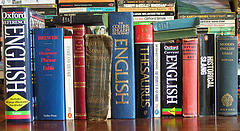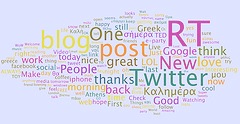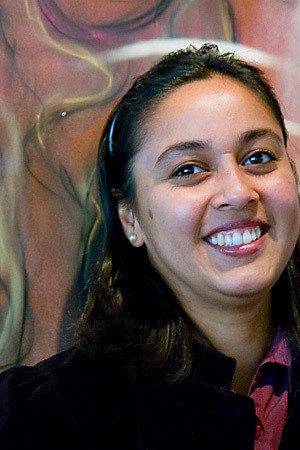New age..new words

Modern English sometimes described as the first global lingua franca used for international businesses continues to be one of the most dominant language spoken across the globe. It has evolved and gone through interesting transitions over the centuries. (Some of the earliest words coined trace back to their ancient Greek and Latin roots.) When I did some preliminary research about this language, I found out that English is a West Germanic language that originated from the Anglo-Frisian dialects brought to Britain by Germanic invaders from various parts of what is now northwest Germany and the Netherlands. What fascinates me further about this language is the flexible and the malleable nature of the English lexicon that has its borrowings from different places and cultures over the years.
There are the fashionable French expressions we all like to use when it comes to food, fashion and travel. Bon appetit literally means good appetite and used commonly to state – enjoy your meal. A la carte (literally means ‘on the menu’ that we often see in restaurants). Café (as in coffee in French or coffee shop that we commonly refer to in English ). Tres chic (literally translates as very stylish). It is used to express ‘stylish’ or ‘smart’ as an element of fashion and the counterpart of posh. Haute couture (literally meaning custom-fitted clothing and typically used to express trend-setting fashion). Adieu (meaning goodbye that we commonly wish each other at the time of farewell). Bon voyage (literally meaning good journey, that has been adopted to express, have a good trip!). And don’t we all know what it means when someone exclaims – c’est la vie! Meaning, such is life! It has evolved to mean things like ‘It is what it is’ and at times used as an expression to say that life is tough but that one must accept it for what it is with an optimistic demeanor.
Then ofcourse there is some of the Asian influence, borrowings from Sanskrit, one of the ancient languages from India that we see being used commonly like Guru (Sanskrit script गुरु, meaning a teacher, as someone we revere and respect for his or her knowledge and wisdom). These days, we use it to describe someone who is an ‘expert in something’ in the modern context. Avatar (अवतार, which means manifestation, and refers to the human incarnation of God per the Hindu mythology.) In modern usage we see it as the graphical representation of a user especially in the social media context. Then ofcourse, most of you are familiar with James Cameron’s Oscar winning movie Avatar in today’s context. Cashmere (originates from Kashmir, the Himalayan region of Northern India where this fine wool is derived from the undercoat of the cashmere goat).
Karma (कर्मा, which means work or fate). We see it being used commonly as bad karma (which refers back to the philosophy of, you reap what you sow). Mantra (from Sanskrit मन्त्र mantra refers to a holy message or text typically used as ‘spiritual chanting’) whereas, in the modern context the English language borrows it to connote what is the code you live by? Such as – what is your life’s mantra? Or in a marketing jargon it could imply the mystical formula to coin their mission statement or as trendy buzzwords for eg: Nike’s mantra is ‘Just Do it’.
We are in an interesting age today where we have not only borrowed from or introduced new words but evolved to a time where  we’ve started ‘verbalizing’ in interesting ways. We’ve come a long way from the Greek and Latin origins of words, and today’s influx of social media has a lot to do with the infiltration of that lexicon. We have not only started using social media terms in our daily dialogues, but have created ‘new verbs’ along the way! Highlighting a few of our common ones.
we’ve started ‘verbalizing’ in interesting ways. We’ve come a long way from the Greek and Latin origins of words, and today’s influx of social media has a lot to do with the infiltration of that lexicon. We have not only started using social media terms in our daily dialogues, but have created ‘new verbs’ along the way! Highlighting a few of our common ones.
Did you google the term? The word ‘Google’ which is the name of a famous search engine, is a play on the number ‘googol‘. A googol is equivalent to a 1 followed by 100 zeros and is indeed an extremely large number. This term reflects the infinite and ever-increasing volume of information that is currently available on the Internet.
I tweeted it to my friends. Twitter (verb) originally is described as – to make high-pitched sounds, as of birds. In the social media age, Twitter today is commonly known as a social networking and microblogging site that enables its users to send and read messages known as tweets. Tweets are text-based posts of up to 140 characters.
You must unfriend him after what happened! In today’s context, it refers to our digital relationships such as our Internet friendships. Unfriending here is to remove from one’s friends list on a social networking site eg: the Facebook friend list.
I blogged about today’s news. Blog is a word that was created from two words: “web log”. It refers to today’s digital diary and serves as a shared on-line journal allowing your voice to be heard and shared with your vast online audience. It empowers users to reflect, share opinions, and discuss varied topics digitally. (E.g. of some of the current blogging platforms -Blogger,Tumblr, WordPress, SquareSpace, Posterous).
I digg it! Unlike the traditional context of digging in your garden, today social media relevancy is all about social news website made for people to discover and share content from anywhere on the Internet. You get to submit the link and users get to vote and comment on submitted links and stories ranking it in popularity!
I like it! ‘Like’ today has a whole new connotation for a Facebook user. Instead of writing a comment for a message or a status update, a Facebook user can click the “Like” button as a quick way to show approval and share the message with others.
She poked me and I poked her back. Poking as we know it typically is seen as an action of tapping and/or softly jabbing another person with the tip of one’s finger or a sharp object. A poke today is a small application on Facebook that are just little reminders or ways to say hello on Facebook.You poke someone if you just want to say a quick hello, want him/her to look at your profile or just letting them know you’re thinking of him/ her.
The list goes on! What are some of the words like this you’ve been using in your daily jargon? Let’s hear it.
-
http://www.bsablogs.com/ Celebrity Blog
-
Snappoint2
-
Gabster2
-
Gary
-
http://planetforward.org/groups/half-a-year-questions-to-find-out-a-travel-dealership-before-booking-any-kind-of-trip/ Travel







